Democratic presidential contenders went after three targets on the second night of this week’s 2020 Democratic debates: Former Vice President Joe Biden, Vermont Sen. Bernie Sanders and President Donald Trump.
As the frontrunner, Biden faced tough questions, including a brutal back-and-forth over his recent comments about working well with segregationist senators and his past opposition to busing plans used to desegregate public schools from California Sen. Kamala Harris.
“I do not believe you are a racist,” Harris said. “And I agree with you when you commit yourself to the importance of finding common ground. But I also believe, and it is personal, and I was actually very — it was hurtful, to hear you talk about the reputations of two United States senators who built their reputations and career on the segregation of race in this country. And it was not only that, but you also worked with them to oppose busing.”
Sanders, meantime, was pressed over his self-description as a socialist, including a question on whether his proposals like Medicare for All would lead to higher taxes on the middle class.
“Every proposal that I have brought forth is fully paid for,” he said, arguing that insurance premiums would be lower under his proposal. “Yes, they will pay more in taxes but less in health care for what they get.”
And several candidates took the opportunity to hit Trump directly over his 2017 tax cuts, tariffs he’s levied as president and poor conditions at migrant detention centers.
Along with Biden, Snaders and Harris, the second night also featured California Sen. Kamala Harris; New York Sen. Kirsten Gillibrand; South Bend, Ind., Mayor Pete Buttigieg; self-help author Marianne Williamson, former Colorado Gov. John Hickenlooper; entrepreneur Andrew Yang; Colorado Sen. Michael Bennet and California Rep. Eric Swalwell.
Read More: Think You Can Name Every Democratic Candidate for President? Prove It
Here’s a look at the highlights from the second night of the 2020 Democratic debate.
Kamala Harris challenged Joe Biden on his past opposition to busing
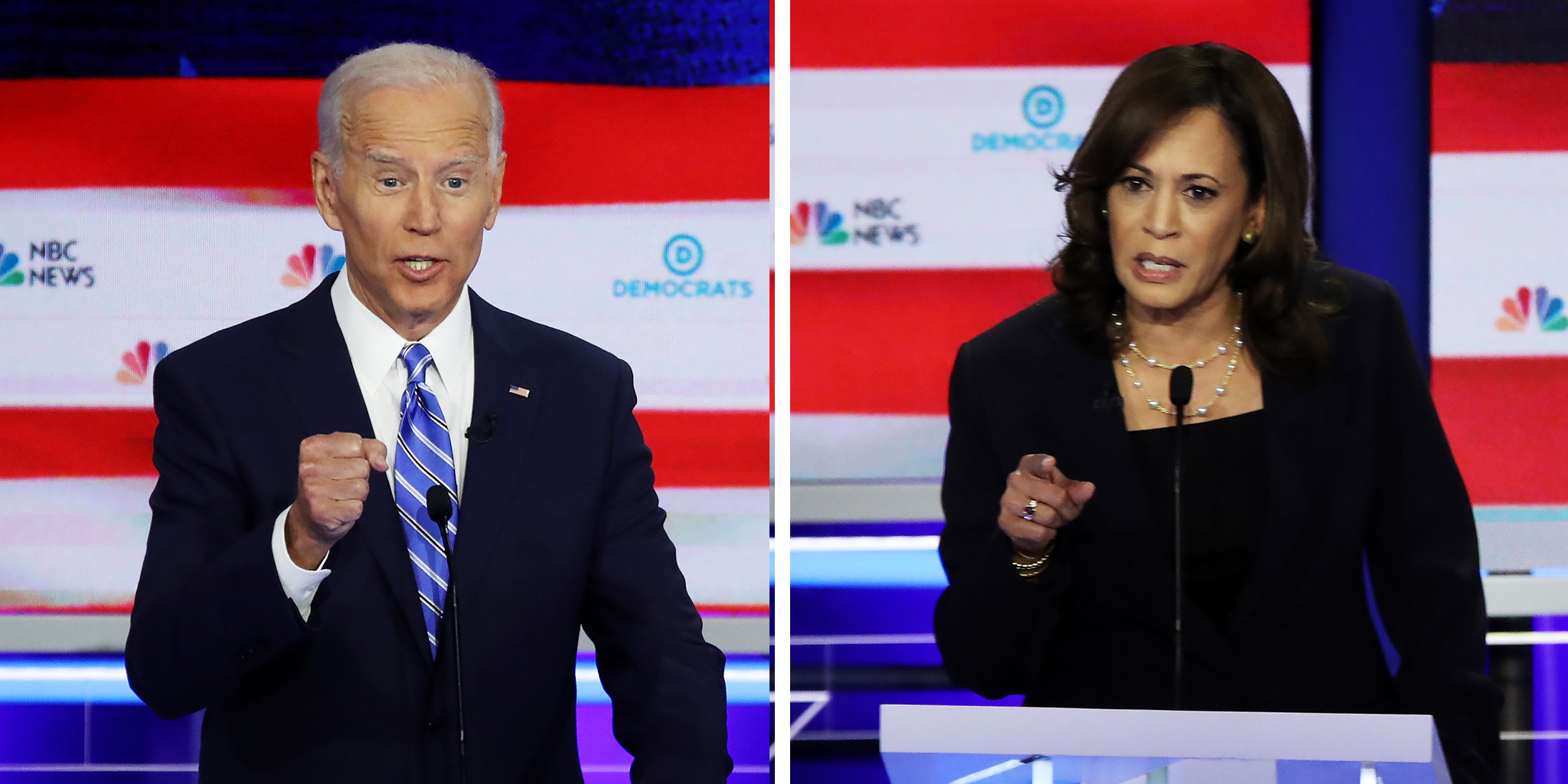
Harris and Biden had an intense exchange when the conversation turned to race, as Harris went after Biden for working with segregationists and opposing forced busing to integrate public schools. Biden’s record on civil rights has come up in the weeks leading up to the debate. Harris said she didn’t think Biden was a racist, but directly addressed his prior work with segregationists and talked about how integration efforts affected her personally.
“I do not believe you are a racist, and I agree with you when you commit yourself to the importance of finding common ground. But it was hurtful to hear you talk about the reputations of two United States Senators who built their reputations and career on segregation of race in this country. It was not only that but you also worked with them to oppose busing.”
She added: “And there was a little girl in California who was part of the second class to integrate her public school. And she was bused to school every day. And that little girl was me. So I will tell you that on this subject, it cannot be an intellectual debate among Democrats.”
In response, Biden called Harris’s comments a “mischaracterization of my position across the board,” and disputed her account. “I did not praise racists, that is not true,” he said. “In terms of busing, you would have been able to go to school the same exact way because it was a local decision made by your city council.”
Harris then directly asked Biden: “Do you agree today that you were wrong to oppose busing in America?”
He answered: I did not oppose busing in America. I opposed busing by the Department of Education.
Harris replied: “But that is where the federal government must step in.”
Read More: Here’s What to Know About Biden’s History With Busing
Eric Swalwell went after Joe Biden’s age
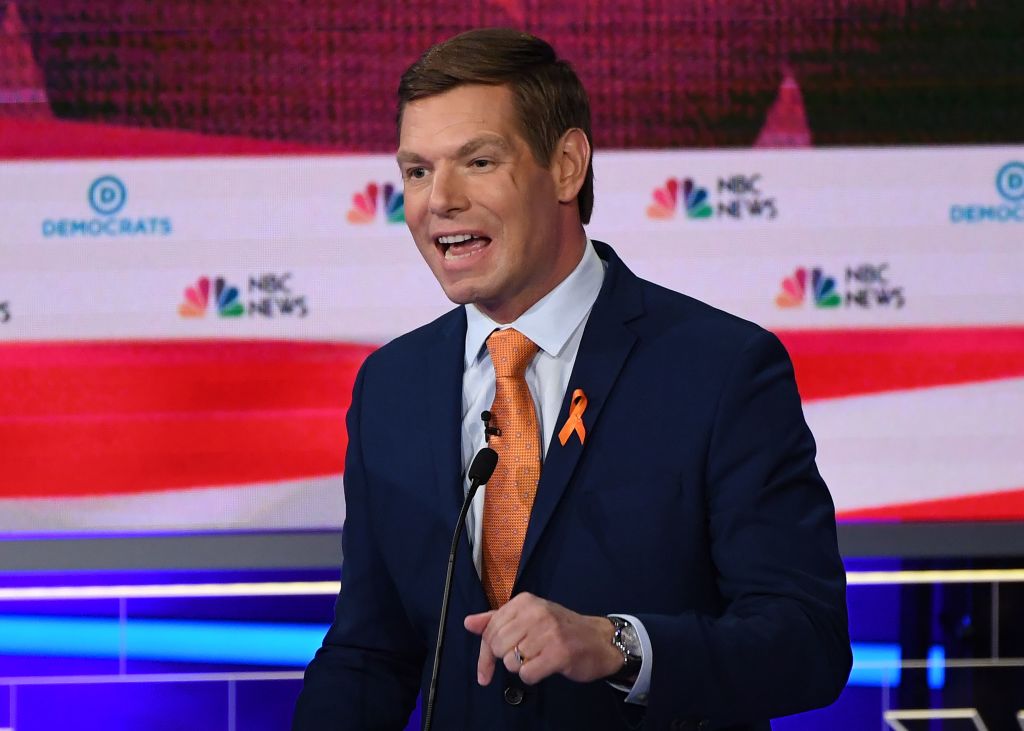
Swalwell, 38, took an opportunity to point out the generational differences on the debate stage, revealing the knife twist slowly.
“I was six years old when a presidential candidate came to the California Democratic Convention and said, it’s time to pass the torch to a new generation of Americans,” he said. “That candidate was then Senator Joe Biden. Joe Biden was right when he said it was time the pass the torch to a new generation of Americans 32 years ago.”
Moderators gave Biden, 76, a chance to respond.
“I’m still holding on to that torch,” he said.
Sanders, 77, jumped in to give what seemed at first like a defense of Biden, but quickly went in another direction.
“As part of Joe’s generation…” he said, before getting cut off. “The issue,” he said, “is not generational.”
“The issue is who has the guts to take on Wall Street, to take on the fossil fuel industry, to take on the big money interest who have unbelievable influence over the economic and political life of this country,” Sanders added.
Swalwell didn’t let the moment go, either. Talking about climate change later in the debate, he returned to it: “Here’s a solution. Pass the torch. Pass the torch to the generation that’s going to feel the effects of climate change.”
John Hickenlooper criticized Bernie Sanders over socialism
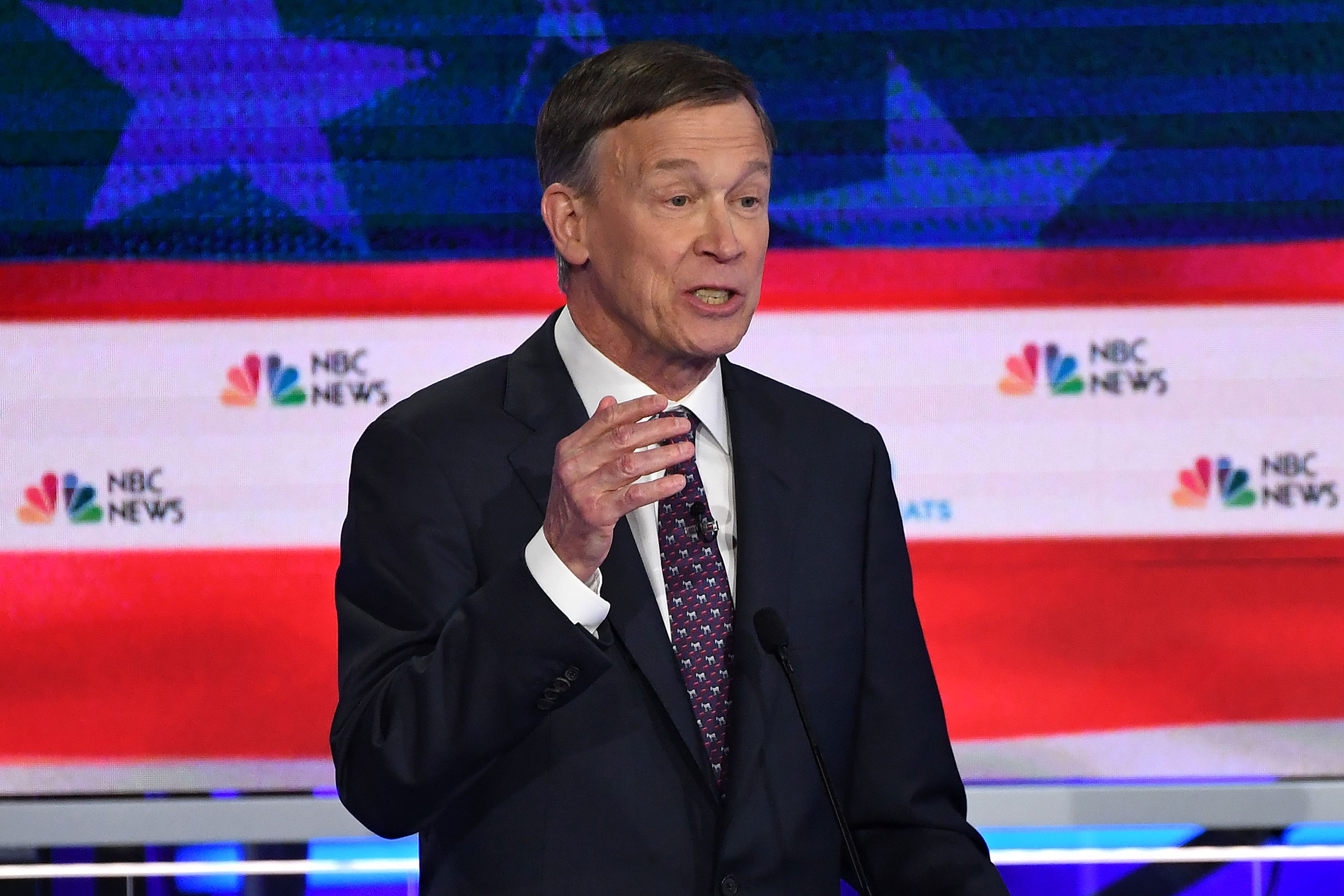
Hickenlooper, who was booed at a California event for criticizing socialism, was undeterred. He argued that while he agreed with the goals of the Green New Deal, he didn’t understand why it included a job guarantee, and that while health care is a right, he did not support programs like Medicare for All that would abolish private insurance.
“The bottom line is, if we don’t clearly define that we are not socialists, the Republicans are going to come at us every way they can and call us socialists,” he said. Later in the debate, he elaborated: “If we turn towards socialism, we run the risk of helping to reelect the worst president in American history.”
Sanders defended himself on the charge that being labeled as socialists could cost Democrats the election.
“I think the responses at the polls, last poll I saw had us 10 points ahead of Donald Trump, because the American people understand that Trump is a phony, that Trump is a pathological liar and a racist, and then he lied to the American people during his campaign,” he said.
Several candidates went after President Donald Trump
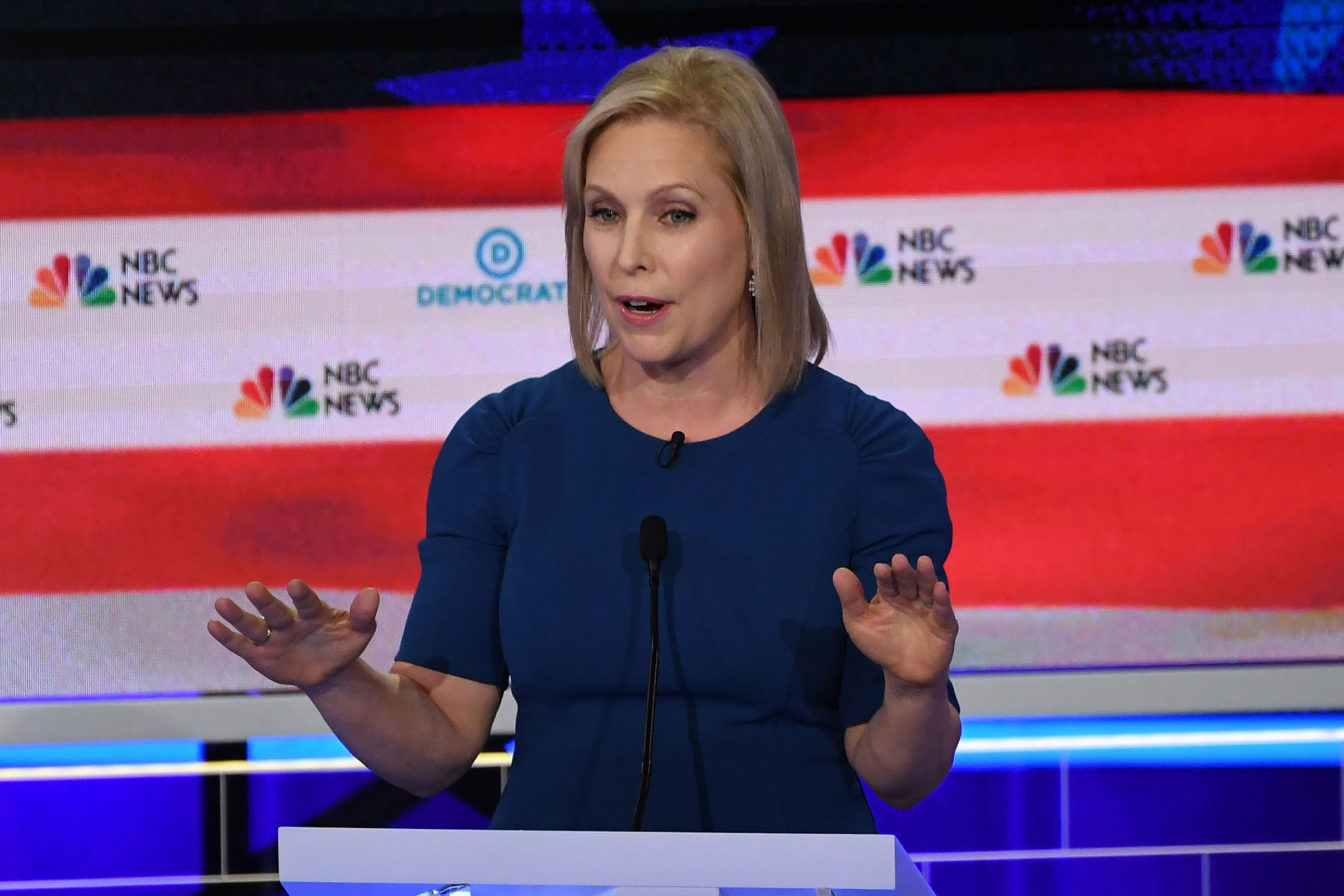
The candidates onstage for the second debate night attacked Trump directly, marking a possible inflection point in the primary for many of the contenders, who have largely avoided fighting with Trump so far. “Donald Trump” were the first words out of Biden’s mouth on the debate stage, in response to a question about systemic change to the economy. Biden has been one of the only candidates going after Trump so far.
But Thursday night, that changed. Multiple candidates, including Biden, Harris and Sanders criticized Trump for his tax bill and the economy. Those three and most of the others onstage, including Gillibrand, Williamson and Bennet spoke harshly about Trump and his Administration separating migrant families at the border.
“The President has turned the border of the United States into a symbol of nativist hostility,” said Bennet.
Hickenlooper went further.
“If you had ever told me any time in my life that this country would sanction federal agents to take children from the arms of their parents, put them in cages, actually put them up for adoption — in Colorado, we call that kidnapping,” he said.
Williamson agreed, calling the separations “kidnapping” and “collective child abuse.”
“If your government does it that doesn’t make it less of a crime,” she said. “These are state-sponsored crimes.”
Later in the debate, the candidates were asked which country they would try to repair U.S. relations with first as president. Buttigieg ducked the question by attacking Trump hard.
“We have no idea which of our important allies, he will have pissed off worst between now and then,” he said.
Every candidate supported healthcare for undocumented immigrants
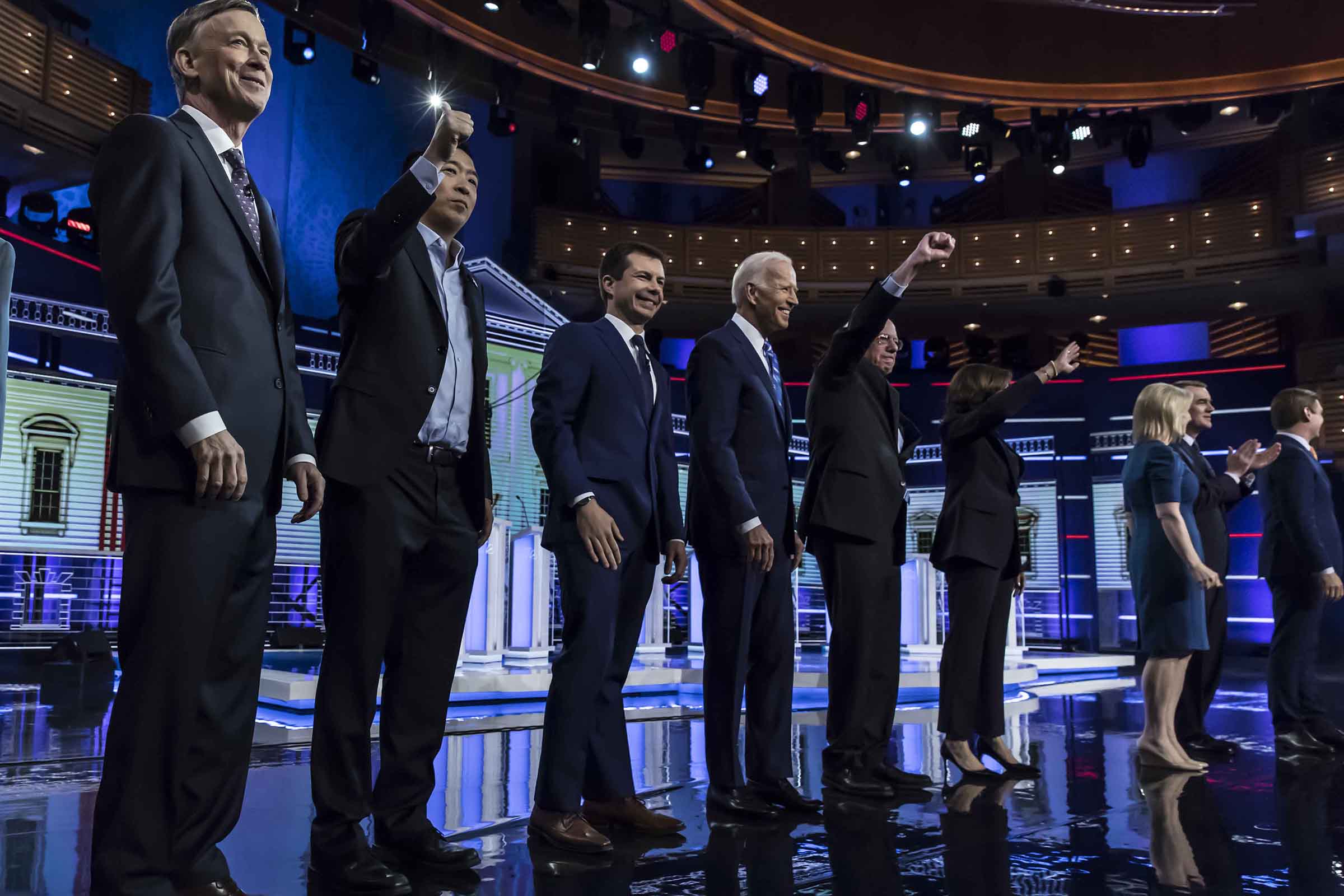
When asked if their health care plan would cover undocumented immigrants, all of the candidates raised their hands.
Although a few of the candidates, including Biden, seemed to be a bit hesitant, others — including Gillibrand and Sanders — shot their hands up.
Buttigieg argued that undocumented immigrants would be able to pay into his proposed health care plan, just as they already pay property and sales taxes.
“This is not about a handout. This is an insurance program. And we do ourselves no favors by having 11 million undocumented people in our country unable to access health care,” Buttigieg said.
Next, Biden argued that providing immigrants with access to health care would ultimately lower costs for everyone.
“They, in fact, contribute to the wellbeing of the country. But they’ve also — for example — they’ve increased the lifespan of Social Security, because if they have a job, they’re paying Social Security,” Biden said, adding that providing undocumented immigrants with health care would lower the costs of emergency treatment for untreated conditions.
Trump took a break from G20 meetings to tweet about the debate
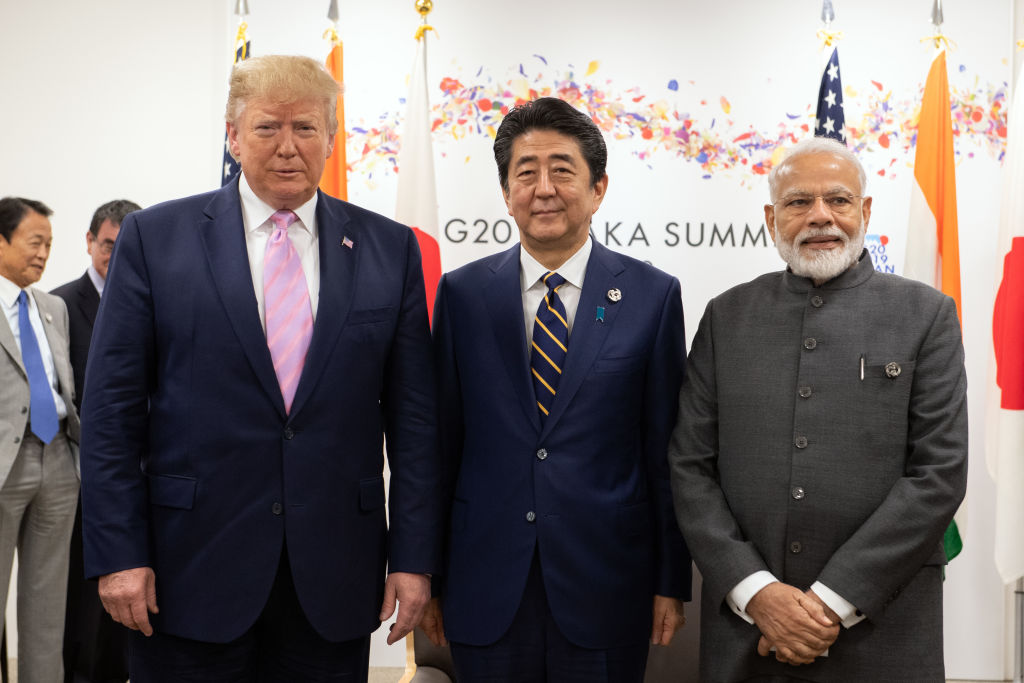
Trump took time out of his meeting with world leaders at the G20 in Osaka, Japan to tweet about Thursday’s 2020 Democratic debate in Miami.
Bloomberg reported that during a break between meetings with Indian Prime Minister Narendra Modi and German Chancellor Angela Merkel Trump tweeted, “All Democrats just raised their hands for giving millions of illegal aliens unlimited healthcare. How about taking care of American Citizens first!? That’s the end of that race!”
Pete Buttigieg was grilled on a police shooting in his town
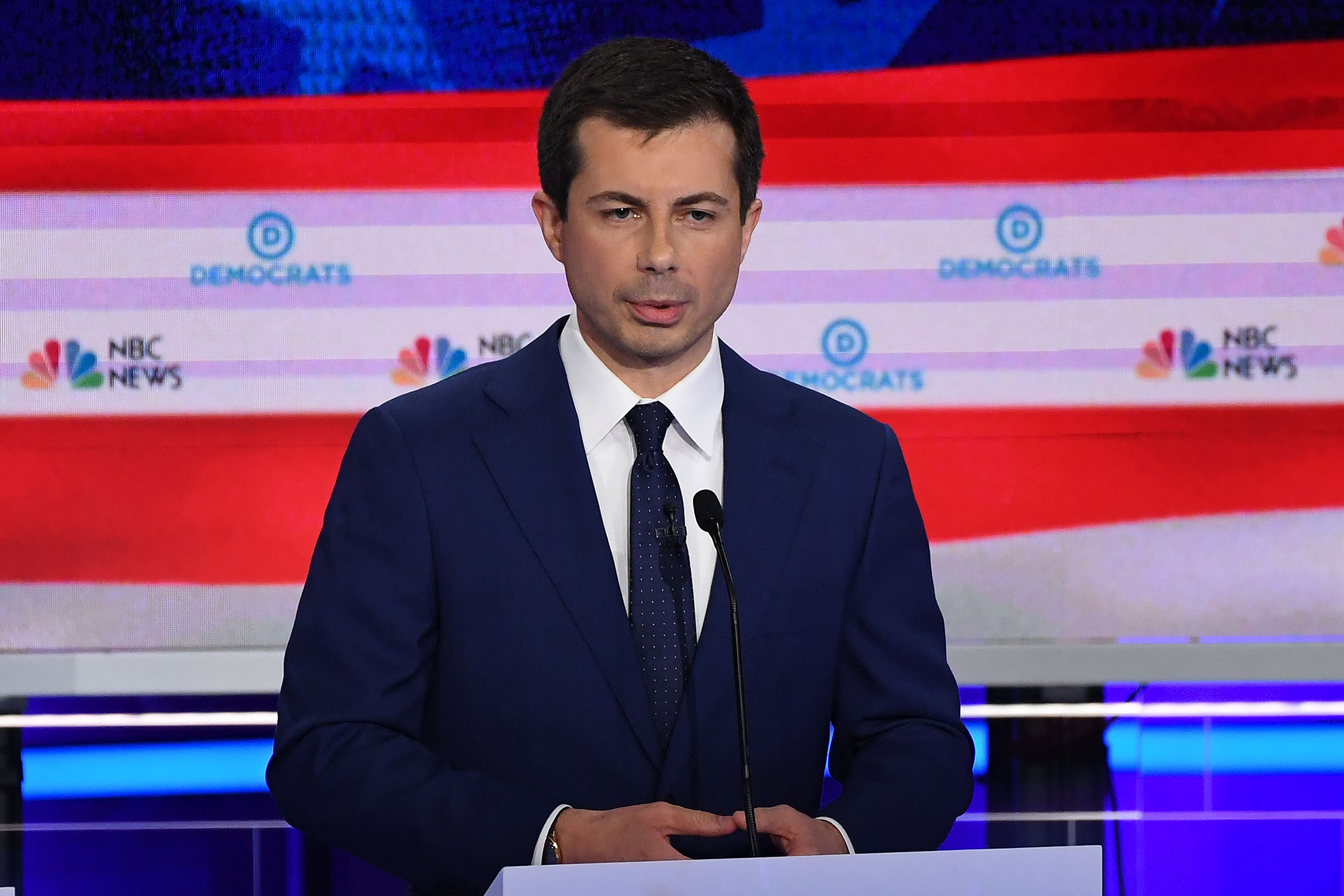
Since a white police officer shot and killed a black man, Eric Logan, on June 16, Buttigieg has faced criticism over whether he failed to adequately address racial inequality and police discrimination in the city.
Asked during the debate why he didn’t manage to hire more black police officers in South Bend — where 26% of the population is black ––Buttigieg responded, “Because I couldn’t get it done.”
NBC moderators quoted a figure that only 6% of the South Bend police force is black.
“It’s a mess, and we’re hurting,” he continued. “And I could walk you through all the things that we have done as a community. All of the steps that we took from bias training to de-escalation. But it didn’t save the life of Eric Logan. And when I look into his mother’s eyes, I have to face the fact that nothing that I say will bring him back.”
Buttigieg said that these issues South Bend faces are really a national problem, and that across the country it’s important to combat systemic racism in police departments in order to defeat what he terms a “Wall of mistrust” that has been built between communities and officers.
“I am determined to bring about a day when a white person driving a vehicle and a black person driving a vehicle, when they see a police officer approaching feels the exact same thing — a feeling not of fear, but of safety,” Buttigieg said.
Eric Swalwell wore an orange ribbon for gun victims

Swalwell wore an orange ribbon on his lapel in honor of Jaime Guttenberg, a victim of the Parkland, Fla. shooting. Guttenberg’s father, Fred, was Swalwell’s debate guest, according to Anthony Man, a reporter for the South Florida Sun Sentinel.
“We are the only candidate that has a plan that would have prevented what happened in Parkland,” Swalwell told Man, according to a tweet. “I’m going to make that clear tonight.”
Bernie Sanders and Kamala Harris supported abolishing private health care
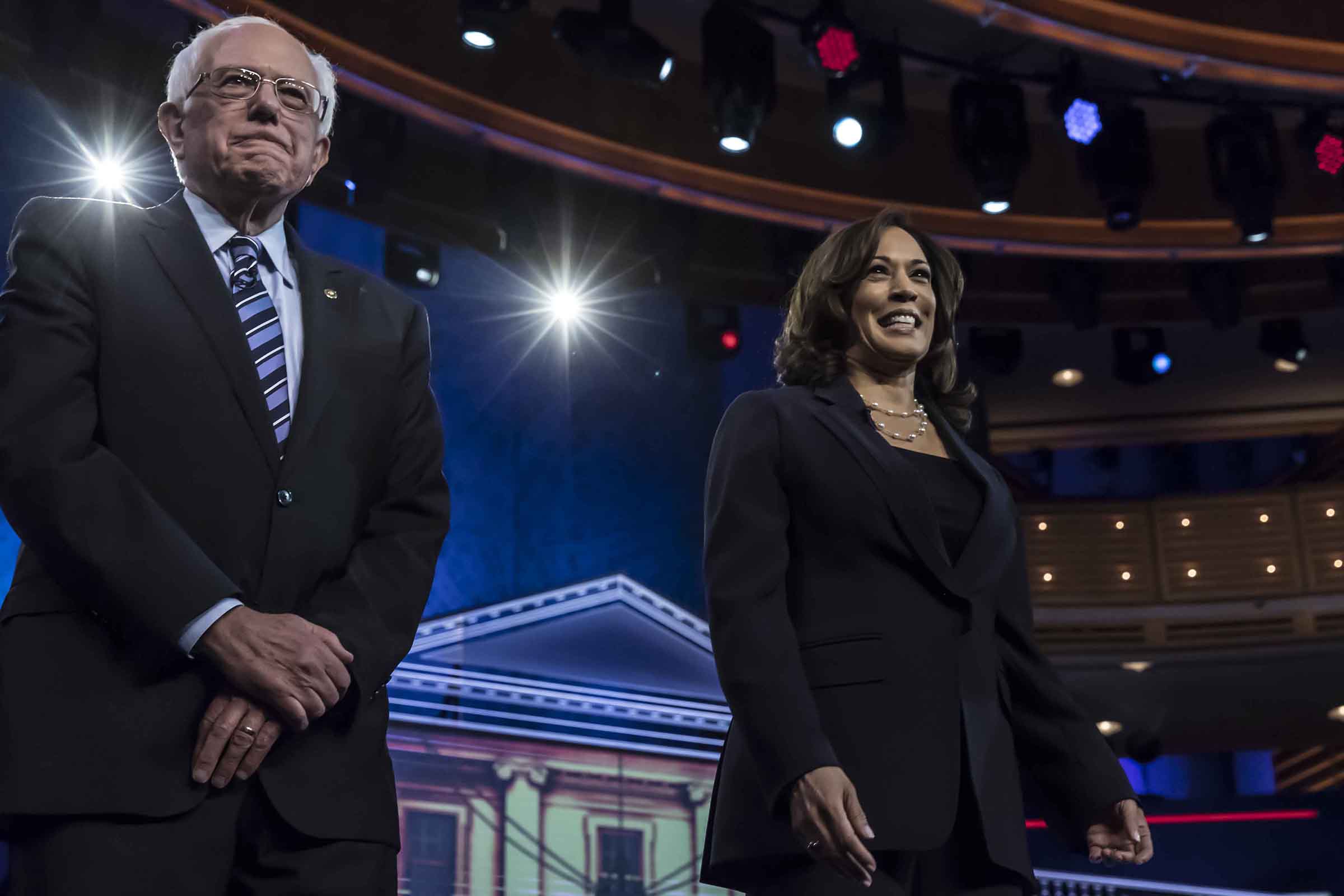
As on the previous night, the candidates on stage Thursday were asked to raise their hands if they would abolish private health insurance as president in favor of a government-run plan. Although only Sanders and Harris raised their hands, Gillibrand answered the question first as though she too agreed with their position, noting that private companies “never put people over their profits, and I doubt they ever will.”
Buttigieg said he would support a plan that he called “Medicare for all who want it,” and that Americans cannot depend on the “tender mercies” of the corporate health care system.
Biden, meantime, spoke in personal terms about the importance of health care as he advocated for a system that builds on Obamacare. He invoked his late son Beau Biden, who died of brain cancer in 2015, and his first wife and young daughter, who died in a car crash in 1972, noting that he couldn’t “fathom” where he would be without health care during those times.
Williamson also weighed in on the issue, arguing that “We don’t have a health care system in the United States — we have a sickness care system.”
Pete Buttigieg and Eric Swalwell talked about their student loans

When asked why he didn’t support free college (as Sanders, Warren, and Castro do) Buttigieg said that he wanted to make college tuition free — but only for low and middle income students. “I just don’t believe it makes sense to ask working-class families to subsidize even the children of billionaires,” he said.
Free college is closely tied to the student debt crisis from existing loans. In April, Warren kickstarted the 2020 conversation on the issue with a proposal that would offer student loan forgiveness on a sliding scale, depending on income. Her plan would eliminate up to $50,000 of student loan debt for people earning less than $100,000 per year.
The next month, Castro put out an education plan that would allow borrowers to have zero monthly payments if they earned less than 250% of the federal poverty line — currently $64,375 for a family of four — and forgive any remaining balance after 20 years.
On Monday, Sanders upped the ante by unveiling a more radical proposal to cancel all student debt for everyone in America, regardless of income.
Buttigieg, who has said that he and his husband carry $130,000 in student debt, took a more moderate position, saying he was open to student loan refinancing: “if you can refinance your house, you oughta be able to refinance your student debt,” he said on Thursday night. (Sen. Amy Klobuchar, who has built her campaign on moderate stances, likewise prefers loan refinancing over outright debt forgiveness.)
“It also needs to be more affordable in this country to not go to college,” Buttigieg added. “You should be able to live well — afford rent, be generous to your church and little league — whether you went to college or not. That’s one of many reasons we need to raise the minimum wage to at least $15 an hour.”
Swalwell, who is 14 months older than Buttigieg, jumped in to note that “I’ve got $100,000 in student loan debt myself” — although he told MarketWatch in April that he has paid it down from $150,000 to slightly less than six figures — and once again drew a contrast between himself and older candidates, saying that “it’s going to be the next generation” who would solve the student debt crisis.
Pete Buttigieg spoke Spanish
Greeted by moderator José Diáz Balart with a “Bueas noches,” Buttigieg broke into brief Spanish before talking about college affordability.
“Buenos noches, gracias de invitado,” he said, which essentially means, “Good evening, thanks for the invite.”
On Wednesday night, primary debate viewers were treated to several moments of candidates speaking Spanish. Former Texas Rep. Beto O’Rourke and New Jersey Sen. Cory Booker both spoke briefly in Spanish, followed by former HUD Secretary Julián Castro, leading some to call it the first bilingual presidential debate.
Several of the other candidates had virtually promised to stay away from the language.
“My Spanish is terrible,” tweeted Andrew Yang.es
Swalwell also promised CNN that he won’t be “butchering” the language during the debate.
Williamson joked last night that it might be time for her to take some lessons.
Harris has previously joked that she only knows one word in the language “pendejo,” which roughly translates to “stupid.”
Meantime, a candidate who didn’t speak Spanish on the debate stage came to regret it. New York City Mayor Bill de Blasio quoted Cuban revolutionary Che Guevara the day after the debate, saying “hasta la victoria siempre,” then later had to apologize.
Read More: Bill De Blasio Tried His Hand at Spanish. He Ended Up in Hot Agua
Kamala Harris had a good one-liner
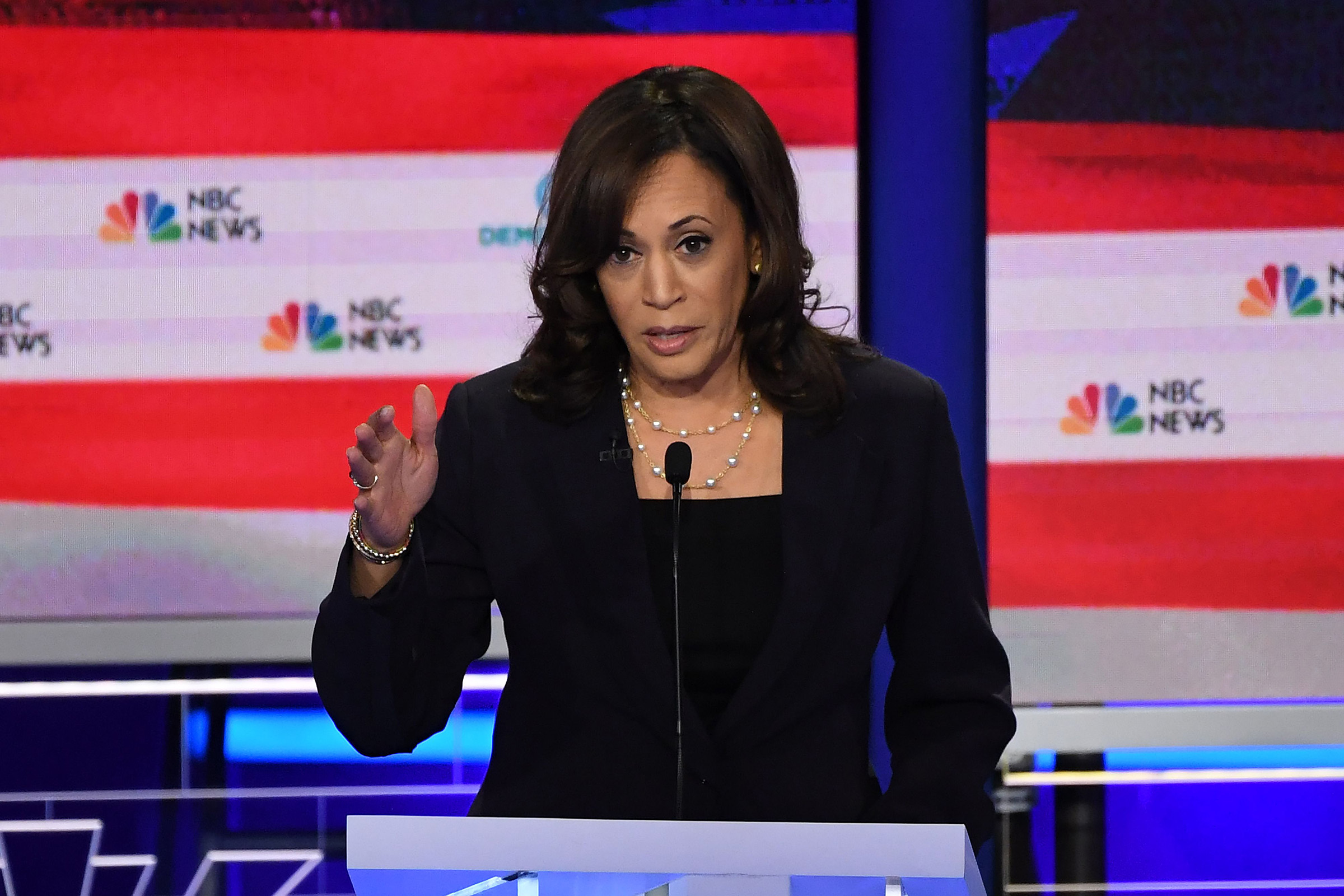
On several occasions, the debate devolved into shouting and cross-talk as candidates struggled to be heard and the moderates struggled to regain control. As a few of the candidates started to talk over each other, Harris smiled and took command of the stage with the first zinger of the night.
“Hey guys, you know what, America does not want to witness a food fight. They want to know how we’re going to put food on their table,” Harris said.
The audience burst into noisy applause, and even Biden paused to clap for Harris.
Andrew Yang did not wear a tie
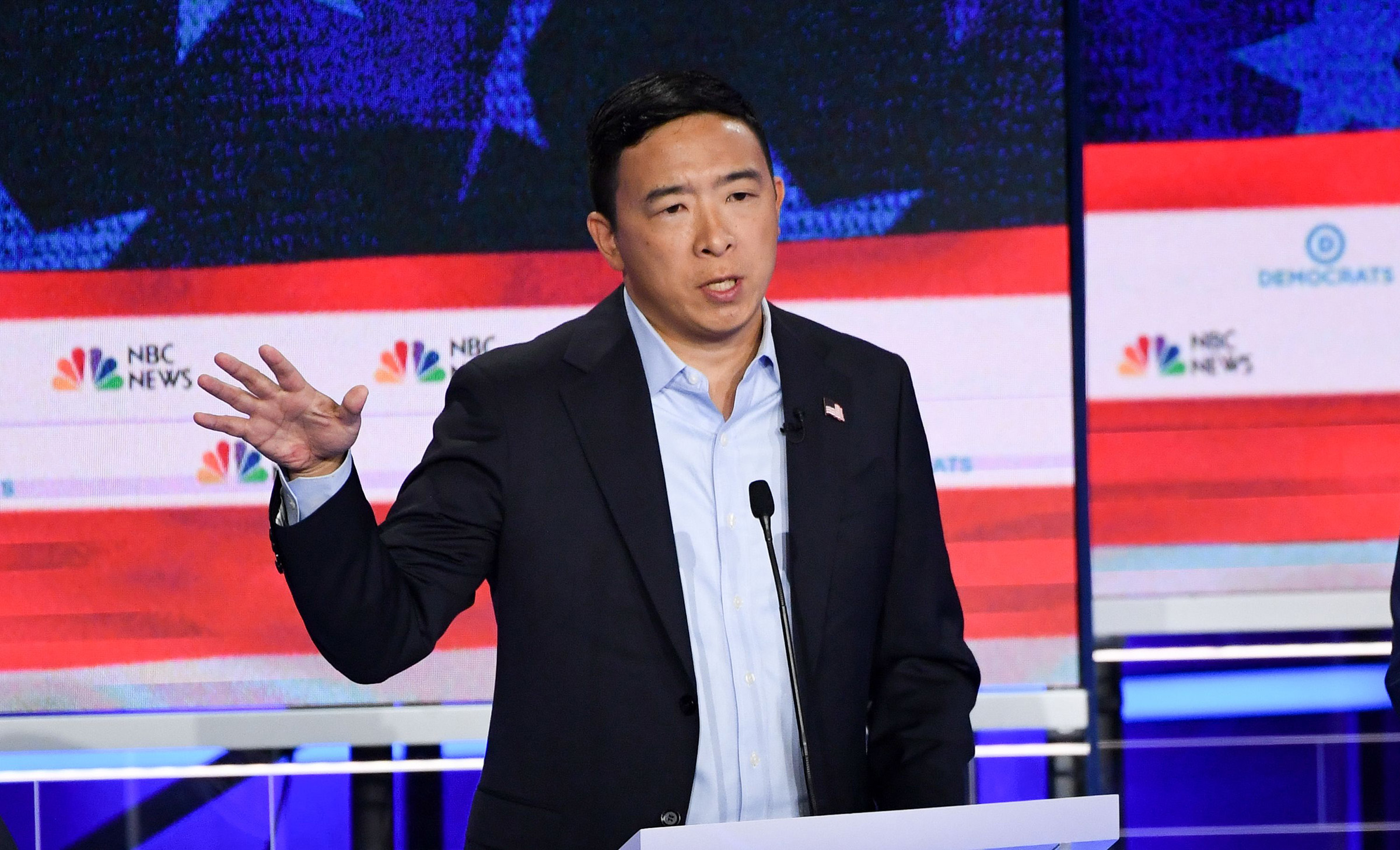
Yang certainly tried to appeal to millennials ahead of Thursday night’s debate. First, in a tweet, the former tech executive “activated” his “Debate mode” — featuring a video backed by a hip-hop song version of his “Yang Gang 2020” slogan, which showed him adding an American flag pin to his jacket lapel.
Yang also made waves when he arrived on the debate stage without a tie. MSNBC anchor Brian Williams didn’t hide his reaction to the fashion choice: “Mr. Yang, would it kill you to throw on a tie?” Many on Twitter agreed with Williams’ surprise, but not all disliked the choice.
With Abby Vesoulis, Tessa Berenson and Madeleine Joung in Washington; Abby Abrams, Tara Law, Rachel Greenspan, Nadia Suleman and Kathy Dowd in New York and Mahita Gajanan in Pittsburgh.
More Must-Reads from TIME
- Caitlin Clark Is TIME's 2024 Athlete of the Year
- Where Trump 2.0 Will Differ From 1.0
- Is Intermittent Fasting Good or Bad for You?
- The 100 Must-Read Books of 2024
- Column: If Optimism Feels Ridiculous Now, Try Hope
- The Future of Climate Action Is Trade Policy
- FX’s Say Nothing Is the Must-Watch Political Thriller of 2024
- Merle Bombardieri Is Helping People Make the Baby Decision
Contact us at letters@time.com
